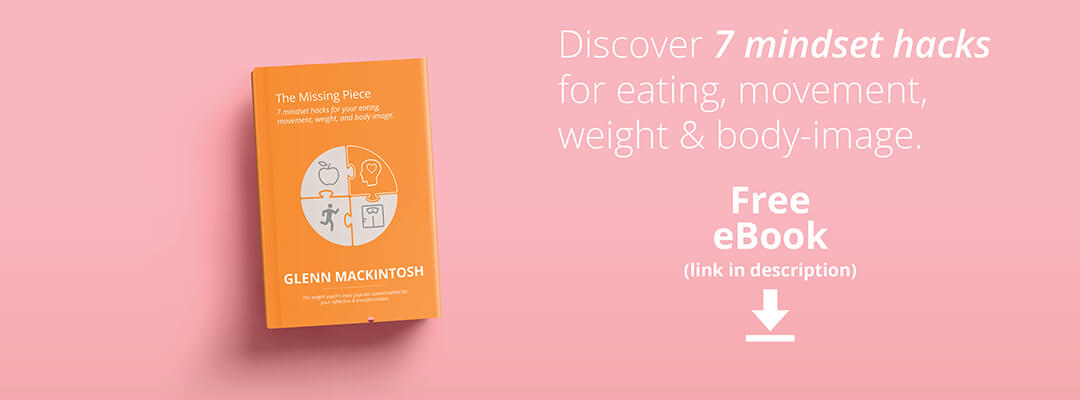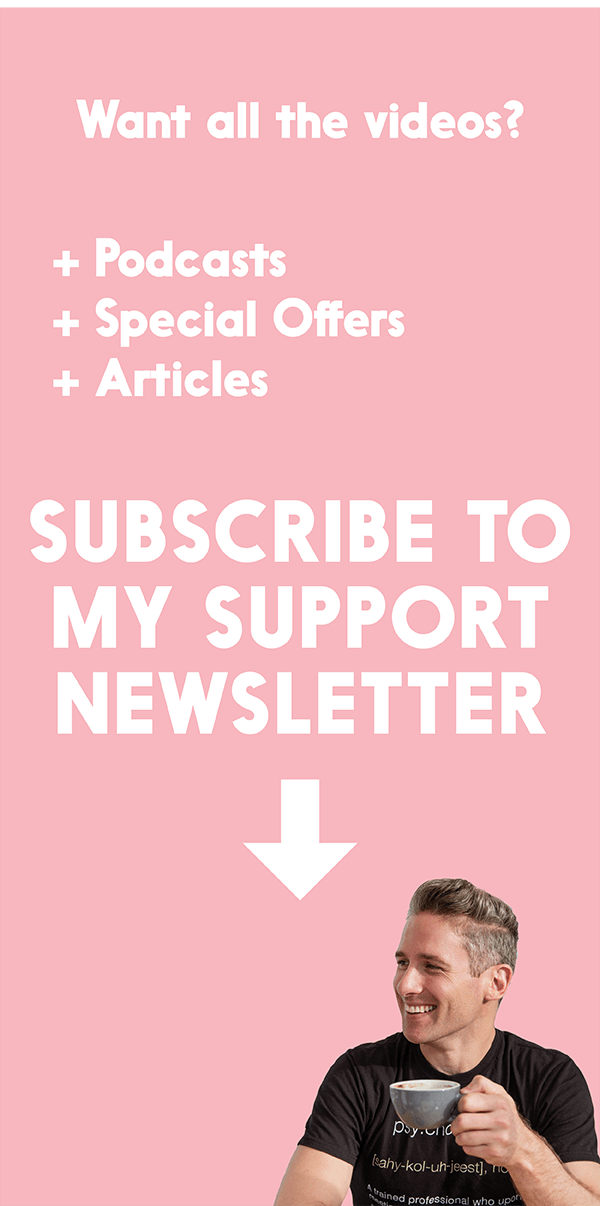
People comment on our weight whether we like it or not. In this Thursday Therapy, I share my five favourite ways to deal with the variety of unwanted comments you may find unhelpful. From heartfelt compliments though to “well intentioned” criticisms and nasty fat shaming – learn how to take them in your stride and keep moving forward!
Watch Video
I created this video for people just like you.
If you found it valuable, please help me share it with them!
LINKS FROM VIDEO
Learn 7 Mindset hacks for eating, movement, weight, and body-image:
DOWNLOAD E-BOOK “THE MISSING PIECE”SHOW NOTES
- Viewer question from an exercise physiologist on “complements” triggering her clients. [1:37]
- Another viewer question on how to deal with others’ input on her weight. [3:14]
- Is the situation is an opportunity to educate. [4:11]
- Examples of scripts to help you educate others on weight, shape, & size comments. [4:40]
- How to react when you don’t want to respond to someone’s comment. [6:20]
- Examples of one-liners for defusing weight conversations. [6:27]
- Identifying genuine compliments and accepting them. [8:27]
- Ignoring comments from others. [9:18]
- How to build resilience to weight comments. [10:54]
- Connecting with the Body Positive movement. [12:25]
- When to seek support from a health care professional. [12:30]
- Parting thoughts on dealing with the variety of unwanted comments on body shape, weight or size. [13:05]
TRANSCRIPT
Welcome to Thursday Therapy. I’m Glenn Mackintosh, The Weight Psych, and today I’m going to give you five great ways to deal with comments about your weight. Hey, guys. Welcome to Thursday Therapy where I answer your questions on the psychology of eating, movement, weight and body image every two weeks. It’s the start of spring here, the weather is beautiful, and luckily we don’t need any lights because the power is out, but we’re still having a productive day at WMP.
Hey, speaking of things that are happening at WMP, our eBook is going bananas. Well, I think we knew that it would be good, but people are absolutely loving it. If you haven’t downloaded it already, we’ll provide a link so you can download that eBook, and it’s Seven Mindset Hacks for Your Eating, Movement, Weight, and Body Image. Speaking of weight and body image, let’s get to answering our questions from today.
Gillian’s an exercise physiologist and an intuitive eating coach, and she’s asked a beautiful question talking about how compliments trigger two of her clients. She’s also had her own experience with overcoming dieting with intuitive eating, and she’s personally experienced how these compliments can trigger her. I won’t read out the whole email because it’s quite long, but we’ll provide it in the transcript, and I’ll just summarise it for you.
One of her people is a bigger person who is losing weight and is triggered by the “you look great” and the “what are you doing to lose weight” comments. Her other client is a smaller person who’s struggled with eating disorders, and she’s triggered by the “you’ve got no fat on you” and “you’re so lucky to be so thin” comments. It’s interesting, and we see this all the time in our practise that often those compliments backfire. For both of these clients it’s actually triggering bingeing which is undoing their body image work.
Now, similarly, Lisa asks the question, “It’s taken me a long time to understand that my weight is my business. I’ve had a partner who wanted me to lose weight, and another who wanted me to put on more. How can I make it clear from the get go that I don’t need anybody’s input on how much I weigh?” Girls, these are great questions, and I like that you’re both searching for more effective responses, really powerful questions.
I think it’s surprising to a lot of us how many people actually get these comments about our weight. I was in sessions with people yesterday, I had seven people and three of them volunteered to talk about these issues without actually knowing that we were going to record anything on it today. I think it’s more than we think. What I’m going to do is I’m going to give you my five top tips, and I’m going to give you which type of person or which type of comment that each strategy might work best for.
As always, I just want you to really reflect on your own situation and the comments that you’re getting or that you might be getting and see what works for you, as always. The first thing that you can consider is whether this is an opportunity to educate that person. Both Gillian and Lisa alluded to this understanding that it’s really not appropriate for people to be commenting on your weight, or your shape, or your size.
It could be an opportunity to explain to that person how that might not be appropriate, and even how it affects you. If you decide to do that, I would encourage you to do it with as much compassion as you can, because people never really respond well to being judged. I’d encourage you to tend to focus more on your own experience rather than what’s politically correct or not. I think that helps the person understand the effect that those comments can have on a real person much better.
For example, I’ve got a client I’ve been working with recently, and he’s a pretty jovial kind of character, and finds that people come and comment about his weight. He’s going to start trying to say, “Hey, you know what, I know that you’re just having a joke, but when you point at me and go, ‘Oh, you’ve gained weight,’ it actually really hurts my feelings.”
Similarly, I’ve had a lot of clients I work with who like to say something like, “Hey, you know what, when you give me those comments, I know that it’s well-intentioned and that you’re trying to motivate me, but the actual effect that it has on me is that I feel a bit judged or a bit frustrated. It actually gets me focused on my weight more than I would like. It makes me end up going the other way.”
I’d encourage you to figure out what your message is to those people. This can be a really good one to do where you’ve got a person who you feel like is probably going to be giving these comments that are going to be negatively interpreted by a lot of people, or it’s someone that you’re going to be seeing a lot and have a lot of contact with, and you really feel like you need to nip this talk in the bud or change that dynamic for the long-term.
Sometimes you just don’t really want to talk about it, so in those circumstances it can be really good to just develop a one-liner to just shut the conversation down. I do this with clients and it works really well. You just figure out your one-liner and you literally rehearse it five or ten times, so when those comments come you’ve got your canned politician soundbite that really just lets the person know that they don’t need to keep talking about it with you.
This can be really, really good for people who are just a little bit nosy. A lot of people struggle with their eating, their weight, and their body image, so some people if they see that you’re losing weight, they’re kind of like, “What’s that person doing?” They want a bit of info for themselves. A couple of one-liners that I quite like is, one, and this depends on your delivery, you can just say, “Yeah. I’m eating a bit better.” You just stop the conversation there, and with your tone and you’re dropping your inflexion at the end, then people understand that it’s not up for further discussion.
Often you can be surprised at how powerful your tone of voice can be in shutting down a conversation. The other one that I quite like and my clients quite like this because it diffuses the responsibility is that you can use me as an excuse, and just say, “You know what, I’m working with this psychologist. It’s going really well. He actually has encouraged me to talk about this a lot less, because he thinks we talk about it too much. It’s part of my work to actually not talk about this too much. If you want a hand with it, I can just send you his details.”
That’s really, really good, because the people who are actually interested in getting support can get support from someone who they’re really going to get some support from, and it doesn’t have to be you. Then most people are probably in that pre-contemplative stage, they’ll kind of go, “Look, I don’t really want to follow it any further.” They’ll be quiet which is what you want.
Another option for you to consider is whether you can practise accepting certain compliments. Obviously you would only be practising accepting compliments that you believe are heartfelt, from people who have your best interests at heart and people who care for you. One way to think of the people around us is they’re all like little mirrors, and each of those mirrors is distorted, because they’re looking through their own lens.
If you decide that there’s a mirror there that is a, “That’s a mirror I would like to look at my reflection in,” and you’d like to take that in, you can practise accepting the compliment. Again, I would actually practise rehearsing it. You might practise rehearsing saying something like, “Thank you. I’m working really hard on it, and it’s obviously paying off, so thanks.”
Sometimes you might just want to ignore the comment or it’s better to let it go. This is the case especially for criticisms and especially where you don’t have a right of reply, like if someone yells out something at you from a car window, or maybe like an internet troll who’s posting nasty comments in the comments section of some social media, someone who you know is never going to change, so it’s not worth your energy to try and educate them or have a conversation around it.
To help you let go of those opinions, I just want you to consider one thing. Think about someone that you really admire, someone like, I don’t know, the Dalai Lama, or Bill Gates, or your favourite musician. Then think about the likelihood of them typing into a keyboard, “Lose weight you fat cow.” It would never happen. That highlights a really important psychological cliché that’s also a truism. When people criticise you, it’s more about them than you. I really want you to remember that.
No people who are feeling really comfortable in themselves and their spot in life are going to give anyone grief about their size or their weight or their shape. It might be better to just let that one go. The last thing that I want you to think about is that whether you’re receiving really bad criticisms or well-intended compliments or anything in between, if it’s having an adverse effect on you, it’s an opportunity for you to build resilience.
These days younger people are not so resilient. They’re not so able to deal with the hard stuff at life, and as you get older, especially if you’ve experienced a lot of weight bias or stigma or discrimination, your resilience gets worn down. It is really an opportunity to practise some resilience around some of this hard stuff.
What I’m not saying is that it’s in any way your fault, but it is one of those crazy paradoxes of doing psychology work is that we have to say even if 99% of this problem is due to other people, other situations, it’s not in your control, we have to focus on that 1% that is under your control. Your response to these things, even if they are bad, is really, really important, and can be really, really powerful for you.
I want you to actually do a bit of looking into resilience and how to build resilience. A few ways to do it to develop a more optimistic thinking style, so you can look into optimism, definitely rely on your support, so rely on your friends, your family, your colleagues. There’s a massive body-positive movement out there that can support you. If you’re finding these comments too triggering and are really sabotaging your progress, great time to seek professional support from a psychologist, a counsellor, or a psychiatrist.
The last thing to do is build resilience by practising your own self-care. If something that has happened to you, you’ve got some type of comment that triggered you or sent you back the other way, it’s no different to if you’d fallen over and hurt your leg. It’s a wound. It’s a mini, little trauma, so you need to take care of yourself in that moment. Thanks for taking the time for another Thursday Therapy session.
In the little break, Emma has told me that this is potentially one of the best Thursday Therapys ever, so I’m going to accept that compliment and say thank you Emma. I think it’s a really good one. Guys, it takes a bit of bravery and a bit of open-mindedness to have a play around with these ideas. For a lot of people this is a fairly loaded topic. I’d encourage you to open your mind. If you need to have conversations with people, be brave.
If you need to practise little techniques, be dedicated, and definitely let me know all about it in the comments section or by sending me an email back. Of course, don’t forget to download our eBook, and I will see you in a couple of weeks at the next Thursday Therapy.





